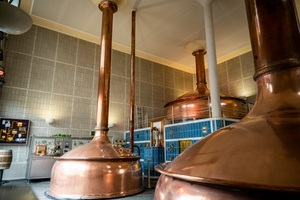Schultze Projects #4 Kresiah Mukwazhi
In the organizer's words:
Every two to three years, the Museum Ludwig invites an artist to redesign the largest wall in the building - the end wall in the staircase. The name Schultze Projects refers to Bernard Schultze and his wife Ursula (Schultze-Bluhm), whose artistic estates the Museum Ludwig manages and in whose memory the series was initiated in 2017.
For the fourth edition of the Schultze Projects, artist Kresiah Mukwazhi (*1992 in Harare, Zimbabwe) has developed a new wall piece. Mukwazhi often uses used items of clothing or fabric, which she sews together and paints, to address the violence of men against women in her home country of Zimbabwe. For her, her art is a form of protest, self-empowerment and a starting point for empowering and supporting women. Mukwazhi sees her artistic practice as visual activism. In her installations, videos, performances, sculptures and textile collages, she makes visible the experiences of women who are exposed to sexualization, discrimination and marginalization in male-dominated societies. The focus is on the body as a site of structural abuse of power. Her works include used accessories, wigs or items of clothing such as petticoats, which are directly or indirectly associated with the female body and social notions of femininity.
In contrast to her mostly figurative paintings to date, Mukwazhi has created what at first glance appears to be an almost monochrome abstract work for Cologne. Only on closer inspection does the material she has used become recognizable: the straps and fastening bands of thousands of used bras. With a length of over thirteen meters and a height of more than three meters, this is her largest fabric work to date. Through the material, which is exported to African countries by industrialized nations as used textiles, Mukwazhi refers to ongoing colonial conditions and at the same time produces a monumental work that, according to the artist, expresses "the power of female collectivity" and wants to "reclaim the sacred character of women, who should be seen and celebrated as royal beings". At the same time, her own observations of gender-specific violence and sexual exploitation in Harare's nightlife, as well as conversations she has had with sex workers, are incorporated. In her new work, the artist also refers to African cultures in which women stand for great spirituality and have a sacred connection to the ground. The removal of clothing has a special significance and illustrates their strength and unyielding resistance to all forms of oppression. This special position and, feared by some, the power of female emancipation is also reflected in the work. In the words of the artist: "This work seeks to reclaim the power and dignity of women in our society today, the marginalized, those who have rebelled against the oppressive forces of patriarchy and have been labeled problematic because they have chosen to speak out. The activists, the sex workers, the artists, the outsiders, the women who rebel in male-dominated work environments."
At the same time, the title of the work, "Shanduko nhema", written in Mukwazhi's mother tongue Shona, expands the radius of interpretation. In the broadest sense, it can be translated as "Black Reclaim" but also as "Black Lies." translate. The latter can be related to the racist ideologies with which the European powers justified their alleged cultural superiority over non-white people and used as a pretext for the colonization of Africa. The artist herself explains: "In the work I have developed for Schultze Projects, I challenge the negative perceptions associated with the color black - as evil (black magic), as dark, as an outsider (black sheep) - and I present it as a form of empowerment for those it represents."
Kresiah Mukwazhi last presented a major new work at Art Basel Unlimited 2024; in 2023 she had solo exhibitions at the Nottingham Contemporary and the Vienna Secession. In 2022, she was represented in the Zimbabwe Pavilion at the Venice Biennale.
This content has been machine translated.











